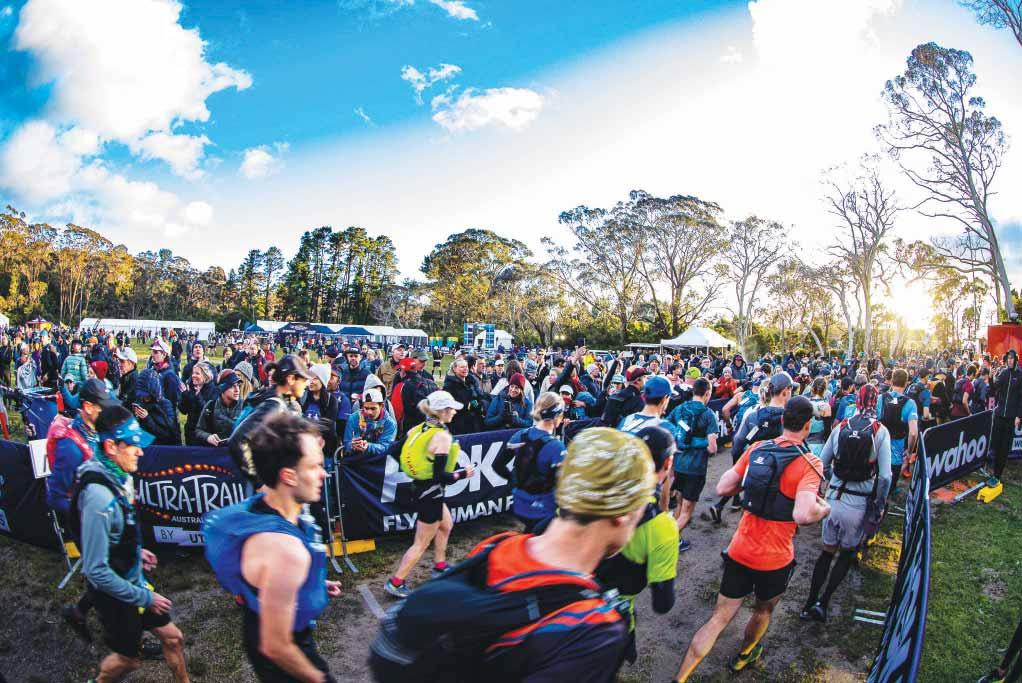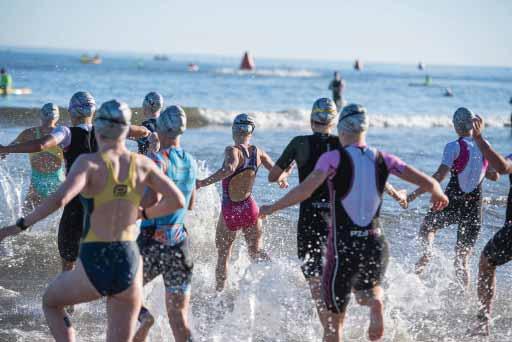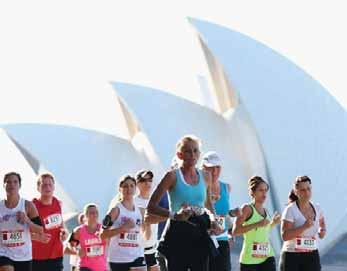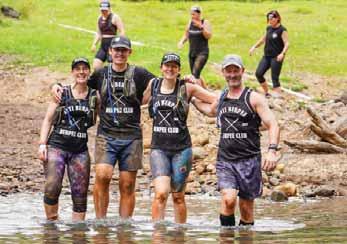
5 minute read
Maximum Eff ort
Ultra Trail Australia by UTMB UTA100.
Maximum Effort
Advertisement
As the Australian Mass Participation Sporting Events Alliance prepares to host its inaugural conference, Nigel Benton looks at the mass participation sector’s post pandemic recovery
It took the challenges of Coronavirus and lockdowns for the various organisers of marathons, fun and colour runs, stair climbs, obstacle races and multisport events that broadened participation by everyday competitors in disciplines such as running, cycling and triathlon to coalesce as an industry group.
With all sharing the same challenges of not being able to operate, the Australian Mass Participation Sporting Events Alliance (AMPSEA) was formed in May 2020 by a group of industry leaders within the sector with the goal of finding a safe solution to delivering mass participation sporting events (MPSEs) in the new landscape of COVID-19.
With AMPSEA representing more than 500 organisations involved in MPSEs, Chris Heverin, Managing Director of Spartan Australia/New Zealand and AMPSEA Chair, advised of the sector’s value back in June 2020, stating “each year, millions of Australians participate in fun runs, marathons, ocean swims, community cycling events, triathlons and challenging obstacle course racing.
“These mass participation sporting events bring people together, benefit public health, create 11,000 jobs, drive growth in regional economies and raise $70 million each year for over 2,500 charities.”
In November 2020, AMPSEA took an argument for a $220 million stimulus package to “ensure our industry can survive” to Canberra, with Heverin and AMPSEA Director Lisa Dowsett along with former Australian Institute of Sport Director, Rob de Castella meeting with the offices of the Federal Minister for Sport, Federal Minister for Tourism and the Parliamentary Running Group.
AMPSEA’s argument was that with other industries such as the arts, zoos, and live events gaining funding, why not the mass participation events industry - highlighting that during 2020 the sector had seen over 19,000 events cancelled, 11,000 jobs lost and over $75 million for charities not able to be raised.
While not succeeding in attracting specific government support, AMPSEA, staged a series of online events, generated awareness for MPSEs and produce best practise risk mitigation protocols to fast-track mass participation events back to business.
With events returning this year, AMPSEA is supporting the industry in the post-COVID world where organisers face reduced entry levels, challenges in attracting sponsorship, huge increases in input and other costs and current rises in the cost of living combined with significant staff and volunteer turnover.

Noosa Triathlon.
A sector that had grown over almost two decades, MPSEs were facing challenges even before COVID.
The growing number of events had seen a fall in participation numbers in some cases while the crowded calendar saw demands for sponsorships grow, with increased competition in securing commercial partnerships.
The Australian Triathlon Endurance and Cycling (ATEC) Expo was a short-lived event held in Sydney 2015 and 2016, before event organiser Informa Events halted it in 2017.
In addition, through 2019, the financial troubles of high-profile US-based market leader Tough Mudder had been played out in the media, with the company forced into involuntary bankruptcy before being purchased by competitor Spartan Race.
Now, in a post-COVID world, MPSEs are facing reduced entry levels, difficulties in attracting sponsorship and huge increases in input and other costs, combined with significant staff and volunteer turnover.
However, participants’ motivation for personal achievement, to improve their health and fitness and engaging socially in the various event disciplines that include and combine running, cycling, triathlon and other challenges, see MPSEs well placed to survive the current challenges.
In addition, MPSEs are also significant economic and tourism drivers. As an example, the annual Noosa Triathlon contributes $22 million to the local economy, supports nearly 100,000 visitor nights and brings more than 22,000 visitors to the region each year.
In a bid to encourage a return to mass participation events in the aftermath of the COVID-19 pandemic, the #togetherwemove initiative has been launched by Abbott World Marathon Majors and Mass Participation World.
Looking to encourage runners back to their in-person
Blackmores Sydney Running Festival. Credit: Abbott Abbott World Marathon Majors. Spartan Race Australia NZ.


events, the partnership has created an inspirational video and marketing toolkit for running events across the world to remind participants and supporters of the joy of taking part together, overcoming adversity together and the wonderful achievements and experiences that mass events provide.
MPSEs are also getting wider recognition.
In mid-2020, World Athletics’ four-year Strategic Plan set out plans to broaden the mass participation components of its business, repositioning some of its non-stadium running events to take advantage of what it called “the mass participation boom” and align them more closely with the health and social objectives of host cities.
World Athletics’ plan also referred to creating “weekend festivals of running” combining “a significant mass participation component” with professional road events like the World Half Marathon Championships and the World Race Walking Team Championships.
It also stated an objective to have cross-country running confirmed as an Olympic sport.
More recently, MPSEs Olympic potential has the Union Internationale de Pentathlon Moderne (UIPM), modern pentathlon’s international governing body, reported to be considering adding obstacle course racing (OCR) as of the 2028 Los Angeles Olympics.
With obstacle course racing rising in popularity and controversy surrounding equestrian disciplines, UIPM could potentially replace equestrian show jumping in the Games event.
Welcoming this Heverin noted “this is incredible justification for the sport, the athletes and the community who have supported Spartan and OCR over the years.”
In addition, Heverin sees MPSEs as playing an increasingly important and recognised role in Australia’s sport and recreation landscape, emphasising “a key pillar and objective of the Australian Government for the 10 years leading into the Brisbane 2032 Olympics and then beyond, is ‘participation’ by the Australian public.
“The mass participation events industry is the largest cohort in the participation space with over 3.4 million Australians, but is currently unrepresented and unrecognised, which does not make sense.”
Heverin sees that the AMPSEA Conference will “provide industry members the opportunity to engage with government officials, develop meaningful relationships and explain our case for support and inclusion within the government funding and support framework.
“I urge all event operators and industry suppliers to roll up their sleeves and support AMPSEA by showing up in numbers at the 22nd November Conference in Sydney and get involved in determining a positive future for our industry.” Nigel Benton is Publisher of Australasian Leisure Management.










